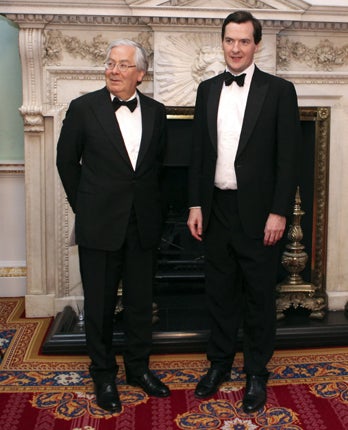Bank Governor 'crossed the line' into politics, says colleague

The governor of the Bank of England, Mervyn King, has been publicly accused by one of his own senior policymakers of prejudicing the impartiality of the Bank.
Adam Posen, an American academic who serves on the Bank's Monetary Policy Committee, appeared with Mr King before the Treasury Select Committee. There, Mr Posen disclosed that he "and at least one other" member of the monetary committee were "concerned" that the language being used about the pace of deficit of reduction was "excessively political in the context of the election" last May.
Answering a question from the chairman of the committee, Andrew Tyrie, as to whether that had "prejudiced the impartiality of the Bank", Mr Posen replied "yes". Asked if that meant the Governor had "crossed the line", Mr Posen waved his arm in an apparent gesture of assent.
Mr King denied the charge. "The Inflation Report appeared after the election and I commented as Governor," he said. "I have never spoken ever about the balance between spending and taxes, let alone about any of the individual measures. I have merely commented about the outlook for the UK economy of the largest peacetime deficit ever."
Mr Posen said that "a number of us" with "concerns" had, through emails and during the MPC meeting, voiced their views to the Governor to no avail.
In the politically charged atmosphere immediately after an inclusive election, the Bank's May Inflation Report urged a faster pace of deficit reduction than in the Labour government's last Budget, in March. Before that, too, the Governor had publicly urged the previous Chancellor, Alistair Darling, to be more "ambitious".
In May, Mr King endorsed the immediate cuts in public spending agreed by the Coalition, but which had been opposed by Labour and the Lib Dems during the election campaign: "I am very pleased that there is a very clear and binding commitment to accelerate the reduction in the deficit over the lifetime of the Parliament, and to introduce additional measures this fiscal year." Mr King said he had done this in response to an open request from the new Government.
The Labour MP John Mann also pressed Mr King on his use of the loaded term "rebalancing" and his seeming endorsement of the Government's line that the private sector will be able to absorb the 490,000 public-sector job losses expected over the next five years. Mr King responded that he had used the term "rebalancing" in its conventional, economic sense, and that they had no "targets" for employment.
Controversy also surrounds Mr King's role in the formation of the Coalition and its policies. In his recently published account, the former chief secretary to the Treasury, David Laws, writes that the then shadow Chancellor George Osborne told Lib Dem negotiators on 9 May: "If we can deliver the £6bn of in-year cuts , that will send out a very powerful message. I will also get the figures to Vince [Cable] for him to look at, and he will find that Mervyn and Nick [Sir Nick Macpherson, Permanent Secretary to the Treasury] are very supportive of what we want to do." Gordon Brown was reportedly "very disturbed" about Mr King's role.
Nick Clegg has said that during a conversation with Mr King shortly after becoming Deputy Prime Minister, Mr King "couldn't have been more emphatic. He said if you don't do this then because of the deterioration of market conditions it will be even more painful to do it later."
Subscribe to Independent Premium to bookmark this article
Want to bookmark your favourite articles and stories to read or reference later? Start your Independent Premium subscription today.

Join our commenting forum
Join thought-provoking conversations, follow other Independent readers and see their replies